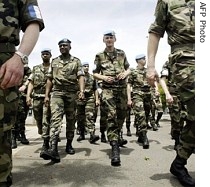2007年VOA标准英语-France Draws Down Troops in Ivory Coast(在线收听)
Dakar
23 March 2007
The spokesman for French forces in Ivory Coast says a recent decision to reorganize and reduce their troops is a reflection of the improving conditions in the country following a peace deal reached this earlier this month. But analysts say the French reduction may be premature. Naomi Schwarz has more on the story from VOA's regional bureau in Dakar.
 |
| French squadron at Abidjan military airport, (May 2004 file photo) |
"The missions of Licorne Force will not be changed," he said. "And this is a technical adaptation which takes into account the positive evolution of the situation on the territory."
The French Defense Ministry says its forces will pull out of the western area of Ivory Coast, and will be redeployed in the center of country as part of a "reinforced battalion."
The ministry also says it plans to reduce the total number of troops over the next few weeks, from 3,500 to less than 3,000.
The French troops have been in Ivory Coast as part of a peacekeeping force after civil war broke out in 2002.
Rascale says further cutbacks are possible.
"If that situation seems to be more and more positive in the months to come, it is not impossible that we will reduce again that French contribution, but at the time it is, of course, too early," he added.
But he says there is no direct link between the French decision to withdraw its forces, and the peace accords signed between President Laurent Gbagbo and rebel leaders in early March. That deal called for a reunification of forces under Mr. Gbagbo and rebel leaders and dismantling a so-called zone of confidence, the name of a buffer zone between the regions controlled by the rebels and Mr. Gbagbo.
The zone of confidence is currently patrolled by the French forces and United Nations peacekeepers.
But some analysts say now is not a good time for France to reduce its forces. Daniel Balint Kurti is an analyst with London-based think tank Chatham House. He says the situation in Ivory Coast is still tense, especially in the western part of the country.
"If you travel through there, you will find a lot villages which have been burned down, some within the last few weeks," he explained. "So when you are on the ground it does not look like it is a particularly brilliant idea to suddenly send the peacekeepers home."
But he says there may be political pressure in France for President Jacques Chirac to show positive developments in Ivory Coast.
"I think it would be a good departure present for Chirac, if he could show that he had some success in Ivory Coast," he added. "That Licorne had come, they had done their job, and now with the accord of both the rebels and the government, they were leaving: mission accomplished."
Elections in France are scheduled for next month and Mr. Chirac is not running for re-election.
Yet Balint Kurti says it would be a mistake to view the peace accords and the French troop withdrawal too skeptically.
He says the accords include many innovative compromises to the disagreements that led to the civil war, including new procedures to determine who should get national identity cards.